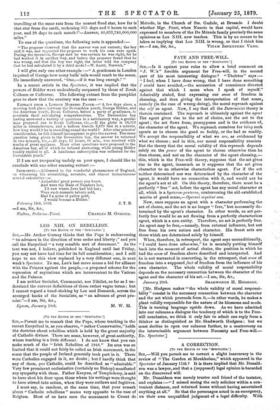FATE AND FREE-WILL
[TO THE EDITOR OF THE "SPECTATOR."] SIR,—Is it against your rules to allow a brief comment on "J. W.'s " forcible argument for Free-will, in the second part of his most interesting dialogue ? " Theletes" says :— " I feel, when I have done wrong, that I have done something I could have avoided,—the accusation of conscience directed against that which I mean when I speak of myself." Admirably stated, first expressing our sense of freedom in choosing, and then giving the interpretation of that sense, namely (in the case of wrong-doing), the moral reproach against the self as agent. Now, I say that all the Determinist theory is therein contained. The reproach is ultimately against the agent The agent gives rise to the act of choice, not the act to the agent ; the act flows from, presupposes and is the evidence of, the character of the agent. We reproach ourselves for being such agents as to choose the good so feebly, or the bad so readily. We accept the responsibility of what we are, as evidenced by what we choose ; and in this, our moral responsibility consists But the theory that the moral validity of this reproach depends solely on the power of the agent to choose otherwise than he does choose, and not on the character of the agent choosing,— this, which is the Free-will theory, supposes that the act gives rise to the agent, inasmuch as it supposes that the act gives character to an otherwise characterless agent. For if the act neither determined nor was determined by the character of the agent, it would have no connection with it, and would not be the agent's act at all. On this theory, therefore, there must be a perfectly " free " act, before the agent has any moral character at all, which is a hysteron-proteron, contravening the old-established maxim of good-sense,—Operari sequitur ease.
Now, once suppose an agent with a character performing the act of choice, and the act is no longer "free," but necessarily de- termined by the agent's character. In other words, an act per- fectly free would be an act flowing from a perfectly characterless agent, which is a non-entity. Therefore, no act is perfectly free. An agent may be free,—namely, from external influence, but not free from his own nature and character. His freest acts are those which are determined solely by himself.
When, therefore, in retrospect, the agent says unconditionally, "I could have done otherwise," he is mentally putting himself back into the moment of actual choice, the position in which he had the sense of freedom above described and interpreted. And he is not warranted in converting, in the retrospect, that sense of freedom into a supposed fact of freedom from the influence of his own character. The whole validity of moral responsibility depends on the necessary connection between the character of the agent and the character of his act.—I am, Sir, &c., [Mr. Hodgson makes "the whole validity of moral responsi- bility" consist in the necessary connection between the character and the act which proceeds from it,—in other words, he makes a plant validly responsible for the nature of its blossoms and seeds. This is turning language upside down. As we have admitted into our columns a dialogue the tendency of which is to the Free- will conclusion, we think it only fair to admit one reply from a thinker as distinguished as Mr. Shadworth Hodgson ; but we must decline to open our columns further, to a controversy on the interminable argument between Necessity and Free-will.— ED. Spectator.]


































 Previous page
Previous page